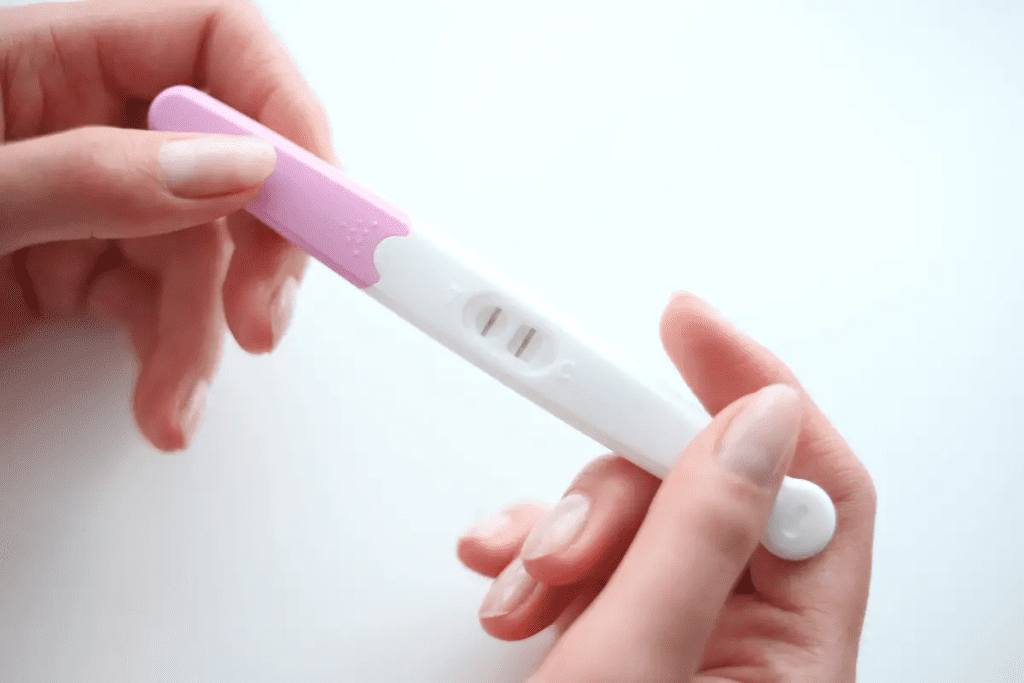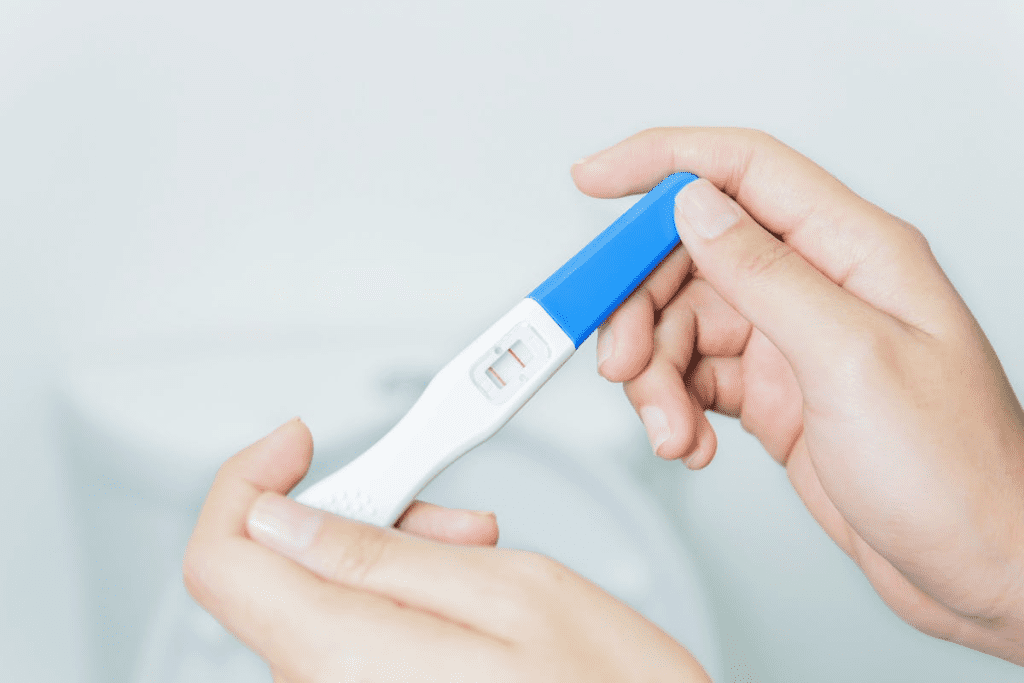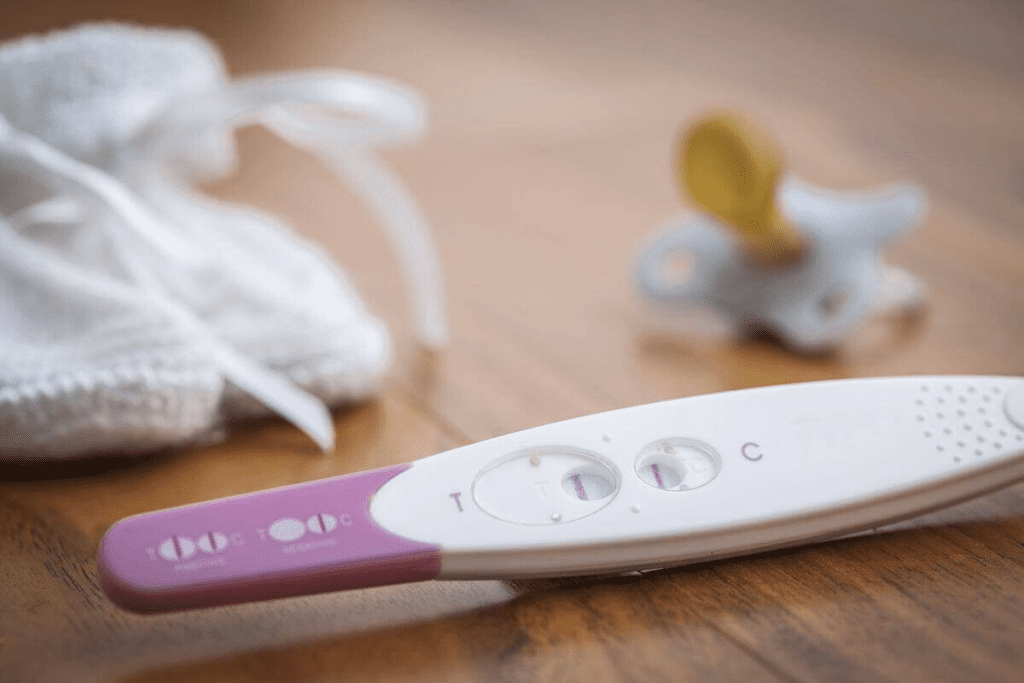Last Updated on November 25, 2025 by
A urine-based pregnancy test detects the hCG hormone. Learn how this common test works and when you should take it for accuracy.
We use a simple yet effective method to check for pregnancy: the urine pregnancy test. This test looks for human chorionic gonadotropin (hCG). It’s a hormone made after a fertilized egg sticks to the uterine wall.

According to my.clevelandclinic.org, most home urine tests work from the first day of a missed period. They claim over 99% accuracy if used correctly. Some urine tests can spot lower hCG levels, showing results up to five days early. But their accuracy can vary.
Learning about pregnancy tests is really interesting. It’s all about human chorionic gonadotropin (hCG). These tests look for hCG in your urine. This hormone comes from the placenta after the embryo attaches to the uterine lining.

Urine tests find pregnancy by looking for hCG. Studies show hCG can be found in urine 7-10 days after ovulation. As pregnancy starts, hCG levels go up fast, making it a good sign of pregnancy.
To test, you pee on a strip or device. It has antibodies that react to hCG. If hCG is there, it binds to the antibodies. This causes a chemical reaction that shows a positive result, like a line or color change.
Today’s pregnancy tests are much better and easier to use. They can spot pregnancy early, even before you miss your period. This is thanks to better hCG detection tech.
Now, there are digital tests that give clear results. Some even tell you how long ago you ovulated or help track your fertility. They use the latest on hCG and other hormones.
Home pregnancy tests have come a long way with new technology. Now, we have many options to pick from. Each one has its own special features and benefits.
Strip and stick tests are the most common at home. They are easy to use and give quick results. These tests look for human chorionic gonadotropin (hCG) in urine, showing if you’re pregnant.
Healthline.com says these tests are usually reliable if used correctly. But, they might not be as easy to read as other types.
Digital tests are a newer option. They show results in words like “Pregnant” or “Not Pregnant” on a screen. This makes them clear and straightforward, cutting down on mistakes. Some even guess how far along you are.
A study found digital tests can be more accurate in some cases. But they cost more than traditional tests.
Choosing between clinical and at-home tests depends on what you prefer. At-home tests are private and convenient, letting you test at home. Clinical tests are done in a doctor’s office, which some people prefer.
Both types look for hCG, but clinical tests might be more sensitive. Healthline.com says at-home tests are very accurate if used correctly. This makes them a good choice for many.

Knowing when to take a pregnancy test is key to getting accurate results. The timing is important because it affects how well the test can find the pregnancy hormone, human chorionic gonadotropin (hCG).
A well-reputed clinic says hCG levels start rising after implantation. This usually happens 6-12 days after fertilization. It’s important to wait until there’s enough hCG for the test to detect.
The best time to take a pregnancy test is after a missed period. Waiting until the first day of your missed period makes the test more accurate. Data from athenahealth.com shows that waiting until then lowers the chance of false negatives.
You can take a pregnancy test before a missed period, but it might not be accurate. Some tests can find pregnancy 4-5 days before a missed period. But testing early increases the chance of a false negative. If you test early and get a negative result, try again after your missed period.
Some things can affect when you should take a pregnancy test. For example, if you have irregular periods, it’s hard to know when you’ve missed one. Waiting at least 21 days after unprotected sex or using a very sensitive test can help. Also, some medicines and health conditions can change hCG levels or test results. Always talk to a healthcare provider if you’re unsure.
In summary, while it’s tempting to test early, waiting until after a missed period usually gives the best results. Knowing the best time and the factors that can affect results helps you make smart choices about your pregnancy.
Using a home pregnancy test correctly is key to getting accurate results. It might seem hard, but by following the right steps, you can get reliable results.
First, always follow the instructions that come with your test kit. The process usually involves collecting urine and applying it to the test strip or device. Always use your first morning urine because it has the most hCG, the hormone pregnancy tests look for.
Here’s a simple guide:
The best time to take a home pregnancy test is in the morning with your first urine. This is because hCG levels are highest at this time, making the test more accurate.
But, if you test later in the day, you can get accurate results too. Just make sure to follow the test instructions well and don’t drink too much before testing. This can make your urine too diluted.
To get accurate results, avoid these common mistakes:
By avoiding these mistakes and using your first morning urine, you can greatly improve your test.
Getting accurate results from pregnancy tests is key for those trying to conceive or confirm a pregnancy. The outcome can greatly affect their plans, whether it’s getting ready for a baby or looking into fertility issues.
A positive test means you’re likely pregnant. Startstemcells.com says a positive result is almost always correct, even if the line is faint. This is because home tests look for human chorionic gonadotropin (hCG) in urine, a hormone made during pregnancy.
But, it’s rare, but false positives can happen due to health issues or meds. If you get a positive, see a doctor to confirm the pregnancy.
A negative test usually means you’re not pregnant. But sometimes a false negative can happen. This might be because you tested too early or didn’t follow the test correctly.
If you think you might be pregnant despite a negative test, try again a few days later or talk to a doctor.
At times, tests show unclear results, like a faint line or an error message. In these cases, it’s best to retake the test a few days later. This allows for more hCG to be detected.
“If you’re unsure about the results or continue to experience symptoms, consulting a healthcare provider can provide clarity and guidance.”
It’s important to understand pregnancy test results to make good choices about your reproductive health. Whether you’re hoping for a positive result or learning you’re not pregnant, knowing what to do next is key.
Pregnancy tests need to be accurate and reliable. This is very important for both expectant mothers and healthcare providers. Knowing what affects test results is key.
Home pregnancy tests are now very accurate, about 99% when used correctly, studies say. But accuracy can change based on several things. These include the test’s sensitivity, when you take the test, and if you follow the instructions well.
Pregnancy test accuracy is usually high, but not always perfect. A study on dvcstem.com shows that while most tests are accurate, there’s a small chance of error. The test’s ability to detect hCG and how well you follow the instructions play big roles.
Here are some important stats:
A false positive can be upsetting. Several things can cause it, including:
Experts say, “A false positive can be caused by many things. It’s important to talk to a healthcare provider to figure out why.”
“A false positive result, though rare, can be caused by many factors like certain meds and health issues. Always check with a healthcare provider for a clear diagnosis.”
False negatives happen more often than false positives. They usually happen when the test is taken too early. Other reasons include:
In summary, while home pregnancy tests are mostly reliable, knowing what can affect their accuracy is important. By understanding these factors and following the instructions carefully, you can get the most accurate results.
After taking a pregnancy test, knowing what to do next can be reassuring. The test result, whether it’s positive or negative, is just the start.
If the test is positive, confirming the pregnancy with a healthcare provider is key. We recommend scheduling an appointment with your doctor. They will discuss prenatal care and options.
At this first meeting, your doctor will talk about:
A negative test can be tough, but don’t give up if you’re trying to conceive. If you’re feeling symptoms or think you might be pregnant, wait a few days and test again. Make sure you followed the test instructions correctly.
If you’re having trouble getting pregnant, we suggest talking to a healthcare provider. They can help find out why and offer fertility options.
Some situations need medical help, no matter the test result. If you have:
Knowing when to see a doctor is important for a healthy pregnancy. We’re here to support you, guiding you through every step.
Knowing how pregnancy tests work is key for those trying to get pregnant or confirm pregnancy. These tests look for human chorionic gonadotropin (hCG) in urine or blood. This shows if a person is pregnant. We’ve looked into the science, types of tests, and how to use them correctly.
A quick summary of pregnancy tests shows their importance. Knowing when and how to take a test is critical. It helps in making smart choices about health. Getting the right test results is important to avoid confusion or delays in care.
It’s important to talk to a doctor after getting test results. They can offer support, answer questions, and guide what to do next. Understanding pregnancy tests helps people take charge of their health and make good choices.
hCG, or human chorionic gonadotropin, is a hormone found in pregnancy. It’s detected in urine through pregnancy tests. These tests use antibodies to spot hCG.
You can take a pregnancy test early, but it depends on the test. Most can find hCG levels around a missed period. Some tests are more sensitive and can detect earlier.
Morning is the best time for a pregnancy test. hCG levels are usually highest in urine then.
Yes, false positives can happen. They might be due to medications, health conditions, or mistakes. But they’re not common.
If you get an inconclusive result, wait a few days and try again. If it’s the same, talk to a healthcare provider.
Home pregnancy tests are very accurate when used correctly. They’re often over 99% accurate. But, test sensitivity and mistakes can affect results.
See a healthcare provider after a positive test. They can confirm the pregnancy and guide you. If you have concerns or questions, get medical advice.
Yes, some medications and health conditions can change hCG levels. This might lead to false or unclear test results.
Digital tests show “pregnant” or “not pregnant” clearly. Traditional tests need you to interpret lines or symbols. Both can be accurate if used correctly.
Subscribe to our e-newsletter to stay informed about the latest innovations in the world of health and exclusive offers!